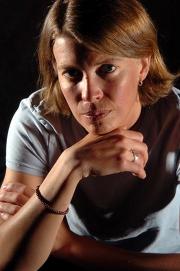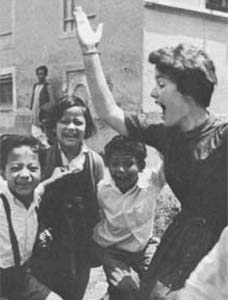
As a Doctors Without Borders volunteer -- RPCV Jennifer Pahl cared for a multitude of malnourished babies she found in refugee camps near the West Darfur town of El Geneina
Girdwood nurse tends to sick babies and mothers in war-ravaged Africa
Healing Darfur
By GEORGE BRYSON
Anchorage Daily News
(Published: May 9, 2005)
Jennifer Pahl was no stranger to death and dying. As a nurse at the Alaska Native Medical Center, she'd seen her share of trauma patients.
As a Peace Corps volunteer and later as a nurse for Doctors Without Borders in western and central Africa, she'd witnessed poverty and starvation firsthand.
But none of that quite prepared Pahl, 31, for what she saw last summer during two intense months in the civil war-ravaged Darfur region of western Sudan, where hundreds of thousands of villagers have been routed from their homes.
As a Doctors Without Borders volunteer -- her third tour of duty with the international relief organization -- she cared for a multitude of malnourished babies she found in refugee camps near the West Darfur town of El Geneina.
Like the starving baby in the slide show Pahl shared with a luncheon gathering of the Alaska World Affairs Council that she addressed recently in Anchorage. A baby whose feet and head appeared far too big for its skinny little arms and chest.
"You'll see the feet swell up like that because of edema, because the kidneys shut down and can't process the water very well," Pahl said, studying the picture as members of the group watched and listened.
"Cracking skin," she said. "The hair tends to get old and it kind of makes them look like an old man. They're dehydrated. A big, fat head and skinny little limbs."
Or the next image of a toddler she found walking around one of the camps "just basically ... almost ... dead," then taken along with her mother to one of the team's medical tents, where eventually both were restored to health.
"This is at discharge, so this is cool," she said. "It's something to be happy about. But it's interesting, too, that you're discharging these children from the hospital and you bring them back in your car and they're all happy, but then you drop them back in a refugee camp."
The typical shelter in the dozens of refugee camps in West Darfur is made of twigs, sticks and trash, Pahl said. Some began to spring up near the border with Chad about two years ago as ethnic-African villagers in western Sudan were systematically forced out of their homes by ethnic-Arab militiamen known as janjaweed (literally "evil horsemen").
At first the janjaweed were enlisted by the government to fight invading rebel forces from south Sudan, Pahl said. But some janjaweed coalesced into roving gangs of outlaws who began burning villages, stealing livestock and attacking the farming communities of Darfur.
"Now the government says they're out of control," she said, "and the janjaweed are basically spreading throughout Darfur, pillaging livestock and raping and chasing people from their normal lives."
The extent of the carnage was hardly known to the outside world two years ago, when Pahl was working as a Doctors Without Borders nurse in the relatively peaceful region of southern Sudan.
Back then, the Bush administration was trying to negotiate a peace agreement between the mostly Muslim Sudanese government forces in the north and the largely Christian anti-government rebels in the south. No one was paying much attention to western Sudan, with its population of mostly Muslim ethnic-Africans, Pahl said.
"It was interesting because all the South Sudanese were just celebrating," she said. "They were having huge rallies: 'Yea, we're going to have peace! We're going to have peace!' -- and meanwhile we were beginning to hear of these insane atrocities going on up north."
After taking a brief vacation last spring, Pahl joined one of the earliest international relief efforts to western Sudan in summer 2004. Her flight from the national capital of Khartoum to West Darfur is still vivid in her memory. Along the way, she kept noticing "these little black splotches on the ground" and wondered what they were.
"It wasn't until you got lower with the plane and you were about to land that you realized that these black splotches you'd seen the whole way were villages the janjaweed had come and burned to the ground and made literally craters in the sand," she said.
One of her first tasks was to assist an Italian epidemiologist interviewing refugees to determine how many people were dying in Darfur. The mortality rate was 5.6 deaths per day per 10,000 people near the Chad- Sudanese border, they found.
"When you get a number of 1.0, that signals a massive emergency, and it's severe," Pahl said. "And we had 5.6 ... numbers that were not believed by many people until we ended up proving them right."
Many of the casualties were children, particularly infants. So Doctors Without Borders set up relief tents for babies and their mothers, and Pahl and others went searching in the scattered camps for children who needed help.
"So I started going out at 6 in the morning in the car with my team and my translator to camps, and we asked, 'Are there any sick babies? Are there any sick babies? ...' And we had carloads. And we just kept bringing them back and bringing them back."
Some refugees were reluctant to leave the security of their camps, Pahl said. They knew their lives were at risk in the desert. Janjaweed bandits with assault rifles sometimes attacked the relief convoys bringing food to their camps.
"You travel into the desert, and it's beautiful, and there is nobody out there," Pahl recalled. "Then all of a sudden you come over a little hill, and there are probably like 500 camels. And there they are the janjaweed."
They don't even try to hide, Pahl said. Janjaweed with Kalashnikov assault rifles behind their robes freely walk the streets of El Geneina, where Doctors Without Borders was based.
"It's pretty impressive to see because nobody does anything," she said. "The government says that the janjaweed are out of their control, but I don't agree with that. I think the government is very much involved with janjaweed. You drive around, and you see the military guys and the janjaweed, and they're all hanging out together having a good time.
"During the day, the military helicopters would fly low just overhead above the camps, so low that I would be sitting there and my hair would be ruffling back. And this is something they did as part of the psychological control to show the people who was in charge."
Back then, Pahl said, the government still wouldn't allow relief organizations to make food drops to refugee camps using aircraft. So Doctors Without Borders and other relief groups had to deliver food to the camps using trucks, which were less efficient and susceptible to ambush.
Sudan is the largest country in Africa, with nine nations and the Red Sea encircling its borders. The Nile River and its headwaters irrigate the eastern half from north to south, while the western half -- primarily the Darfur region, which is about the size of Texas -- is mostly desert.
The United States estimates that so far about 700,000 people have been driven from their homes in Darfur (pronounced dar-FOR). Some have fled to neighboring Chad, while the rest have settled in makeshift refugee camps near the border. Pahl expresses deep respect and affection for the refugees.
"They were self-sufficient before this," she said. "They lived in the desert, but they flourished, and they had money. They were educated, and some of them had nice homes. Now they are 100 percent dependent on outside aid. There is nothing they can do. They can't even get wood; they'd be beaten or raped. They can't do anything. They're just stuck."
Misery breeds more misery in the refugee camps, Pahl said. While her detail focused on providing health care to children and their mothers, other segments of Doctors Without Borders (staffed by about 150 outside volunteers like herself, as well as about 2,000 Sudanese) treated victims of violence or tried to improve sanitation conditions. Some camps had no water and no latrines when they first arrived, she said.
The work was tiring. She usually began her day at dawn, awakened by the public chanting of Islamic prayers. Breakfast was usually a piece of bread. Then the team would board trucks and drive to the camps. Days were hot -- sometimes reaching 118 degrees -- and there were hardly any trees. Lunch was a salad, then they resumed their work until dark. In the evenings, they attended to the women and babies back in the hospitals.
She showed a slide of women dressed in colorful shawls inside one of the relief tents smiling with their infant children -- and laughed.
"It's great," she said. "We had about 30 women and their babies packed into each tent. And the thing about Darfur is the people will go through all this suffering, and you look around at these women and they're smiling."
Tours of duty with Doctors Without Borders (which also accepts assistance from volunteers outside the medical profession) vary by the intensity of the assignment, Pahl said. Her earlier tour in South Sudan lasted six months. But the agency cycles volunteers out of Darfur every two months to avoid burnout.
"It's just pretty draining."
Pahl returned to Alaska last August and has resumed her work as a nurse at the Alaska Native Medical Center. But she still follows the situation in Darfur through correspondence with friends and associates there. And she listens to the news. She's frustrated at how Sudan has slipped out of the headlines in recent months.
"It's not sexy anymore; it's old news," she said. "Everybody knows there is a tragedy going on in Darfur. ... The problem is it's still going on. It's just as bad too. ... Starvation and malnutrition are decreasing, but it's still unacceptable. Very unacceptable."
For now, she's committed to her new job working in the Native medical center emergency ward. But she foresees assisting Doctors Without Borders again. When she left Darfur, she promised the people there she would spread the word.
"People ask me now what I learned," she says. "And I say: 'I learned how to love.' Because, like I said, they're always smiling. It's pretty incredible to see what they've survived.
"And I don't know what we can do about it. What can we do? I don't really know. But we need people to go there and help. They need a lot of help."
Daily News reporter George Bryson can be reached at gbryson@adn.com.









